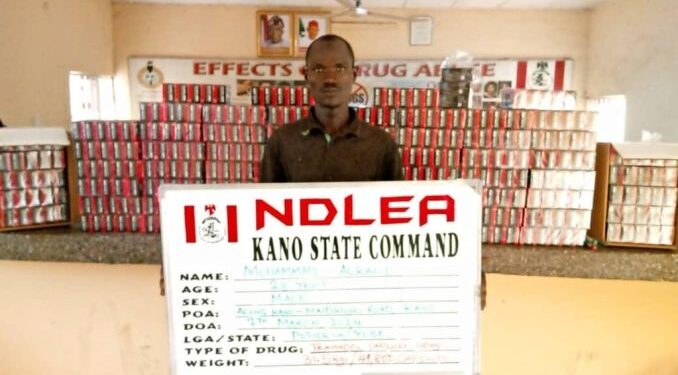The National Drug Law Enforcement Agency (NDLEA), Kwara Command, says a total number of 929 people were arrested for hard drugs related offences between January and December 2024 in the state.
The state Commander, Mrs Fatima Popoola, disclosed this on Monday during a news conference at the NDLEA headquarters in Ilorin.
Popoola said that those arrested included 839 males and 90 females in the state within a year.
She explained that the command conducted series of activities to suppress the supply and demand for hard drugs, adding that 2,642,103 kilograms were seized within the year in review.
“The seized drugs includes cannabis, tramadol, diazepam, methamphetamine, cough syrup laced with codeine, and cocaine/crack.
“Cannabis tops the list of seized drugs accounting to 1,455,529 kilograms, so the state is in dire need of intervention to solve the hydra–headed challenges of abuse and trafficking in cannabis.
“The mop up of 1.5 tones of cannabis is a big saviour to parents and the good people of the state, if not, the destructive effects of the drugs could have been devastating,” she said.
The commander said that 185 hard drugs users were apprehended and referred to the drug demand reduction unit for brief interventions, and were re-integrated with their families.
“In addition to the intervention efforts, 22 clients were admitted in our rehabilitation facility with other 17 clients who are non-residential, coming from their homes for counselling.
“The prosecution and legal service unit secured 133 convictions from the Federal High Court, Ilorin, which involved 123 males and 10 females, while more cases were charged but still pending.
“14 motor vehicles and 12 motorcycles used by the suspects in drug crimes and monies seized were forfeited to the Federal Republic of Nigeria,” she said.
Popoola said that the command, in conjunction with the state government, had also started drug integrity tests titled “Drug Testing Policy”, in which 261 fresh students of Kwara State University, Malete, were tested.
“The vice chancellor; dean of student affairs, and all the fresh students tested proved negative for hard drugs. Many thanks to the university for providing a favourable and suitable climate for the test.
“Other institutions of higher learning need to emulate such a policy that will help Nigeria achieve Sustainable Development Goal 3: “Health and wellbeing for all by 2030”,” she said.
The commander, however, said that the rehabilitation centre that could accommodate 200 people for treatment and counselling of drug addicts, had not been completed due to paucity of funds.
“Also, the command needs official vehicles in all the eight stations for easy mobility, and funds for other necessary things in the office,” she said. (NAN











